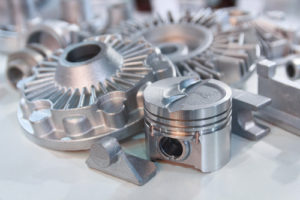
Non-Ferrous Metal Types
Foundries use non-ferrous metals in die cast mold making or surface treatment, as the metallurgical properties are best fits for certain applications in different segments. Ferrous metals have higher melting points than non-ferrous metals hence they are only used for products that require ferrous materials.
Melting point is an important feature in metal casting as a whole; if a metal requires higher temperature to melt through heat treatment, it will not provide the same kind of conformance to desired shapes as non-ferrous counterparts do. So, if a product can be cast with a non-ferrous metal, foundries prefer materials that melt at lower temperatures and flows to the internal cavities of a casting without getting cooled down quickly. That may affect fluidity, which cause the molten metal to not conform to the predetermined die shape.
Aluminum for Automobile Industry
Aluminum offer cost-efficiencies to foundries and allows incorporating unique shapes and designs in the casting. The ferrous metal melts at 660 Degree Celsius, is a malleable material, and has high electrical and thermal conductivity. It is easier to melt aluminum and make the molten metal to solidify in the die cavity, and get shapes that conform to specifications of the casting. It is also used to make prototypes of automobile parts with CNC machining, which makes use of three-dimensional stimulation software that aids in designing stage of die casting. The applications of aluminum castings can be seen in both the exterior and interior of automobiles.
Zinc for Electrical Hardware
Zinc products can be manufactured through the casting process, and the surface of zinc casting can be polished through chrome plating. This is widely practiced by foundries to make nickel resist corrosion and prevent wear and tear in future. Nickel chrome plating zinc can make the product resist corrosive agents, the exposure of which is harsh in industrial environs. In addition to that, the surface of zinc castings can be electroplated with an extra layer of copper. For a non-ferrous metal, zinc is hard, self-lubricating, dimensionally stable, and has mechanical properties that make it perfect for thermal and electrical conductivity.
The applications of zinc castings are paramount in automobile industry, but more than that, it is used for producing electrical hardware. Further, even titanium is cast for making golf clubs, as the metal is very strong and lightweight that enables a much faster swing for golfers when compared to harder alternatives such as steel.
